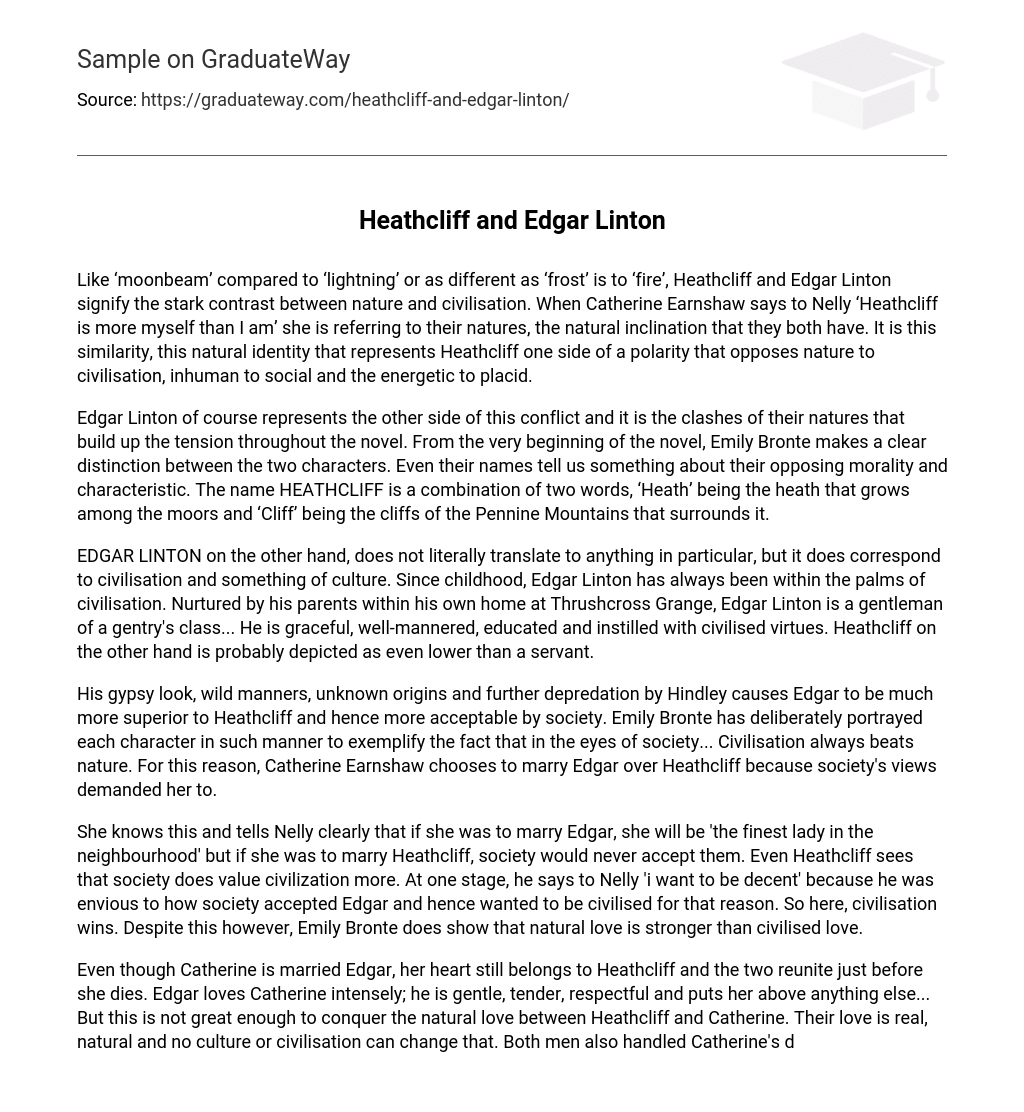Like ‘moonbeam’ compared to ‘lightning’ or as different as ‘frost’ is to ‘fire’, Heathcliff and Edgar Linton signify the stark contrast between nature and civilisation. When Catherine Earnshaw says to Nelly ‘Heathcliff is more myself than I am’ she is referring to their natures, the natural inclination that they both have. It is this similarity, this natural identity that represents Heathcliff one side of a polarity that opposes nature to civilisation, inhuman to social and the energetic to placid.
Edgar Linton of course represents the other side of this conflict and it is the clashes of their natures that build up the tension throughout the novel. From the very beginning of the novel, Emily Bronte makes a clear distinction between the two characters. Even their names tell us something about their opposing morality and characteristic. The name HEATHCLIFF is a combination of two words, ‘Heath’ being the heath that grows among the moors and ‘Cliff’ being the cliffs of the Pennine Mountains that surrounds it.
EDGAR LINTON on the other hand, does not literally translate to anything in particular, but it does correspond to civilisation and something of culture. Since childhood, Edgar Linton has always been within the palms of civilisation. Nurtured by his parents within his own home at Thrushcross Grange, Edgar Linton is a gentleman of a gentry’s class… He is graceful, well-mannered, educated and instilled with civilised virtues. Heathcliff on the other hand is probably depicted as even lower than a servant.
His gypsy look, wild manners, unknown origins and further depredation by Hindley causes Edgar to be much more superior to Heathcliff and hence more acceptable by society. Emily Bronte has deliberately portrayed each character in such manner to exemplify the fact that in the eyes of society… Civilisation always beats nature. For this reason, Catherine Earnshaw chooses to marry Edgar over Heathcliff because society’s views demanded her to.
She knows this and tells Nelly clearly that if she was to marry Edgar, she will be ‘the finest lady in the neighbourhood’ but if she was to marry Heathcliff, society would never accept them. Even Heathcliff sees that society does value civilization more. At one stage, he says to Nelly ‘i want to be decent’ because he was envious to how society accepted Edgar and hence wanted to be civilised for that reason. So here, civilisation wins. Despite this however, Emily Bronte does show that natural love is stronger than civilised love.
Even though Catherine is married Edgar, her heart still belongs to Heathcliff and the two reunite just before she dies. Edgar loves Catherine intensely; he is gentle, tender, respectful and puts her above anything else… But this is not great enough to conquer the natural love between Heathcliff and Catherine. Their love is real, natural and no culture or civilisation can change that. Both men also handled Catherine’s death differently. When Heathcliff hears about Catherine’s death, he bashes himself against the tree.
Edgar on the other hand, though full of sorrow and misery, he is much calmer. This contrast shows us that Edgar is a much calmer person, he has self-control while Heathcliff actions are governed purely by his feelings and passion. But it is also because of this passion that Heathcliff has, that causes Edgar to not only lose Catherine but also his sister, daughter and all of his other possessions. Here Emily is trying to depict that civilised people are weak.
Heathcliff’s actions may be ‘inhumane’, ‘devilish’, ‘cruel’, ‘selfish’ as described by Isabella Linton, it is due to the fact that his actions are governed by his passion instead of civilized thoughts that leads him in taking away so many things from Edgar and making Edgar’s life miserable. Edgar on the other hand, because of his civilised ways, it causes him to be weak and be a ‘milk-blood coward’ which prohibits him from stopping Heathcliff taking away all these things from him. In the conflict between Heathcliff and Edgar Linton, nature vs. Civilisation…
It seems that Emily Bronte supports neither nature nor civilisation whole sided. She makes it clear that within society, civilisation will always be better than nature but also shows that natural love can never be beaten by civilised love. What she is trying to say is that nature and civilisations all have benefits on its own but it is the conflict between the two that causes all the trouble. Even though Heathcliff did take all of Edgar’s possessions away, he wasn’t that happy in the end. This shows that in the conflict, no one totally wins, it was just a matter of clashes between the two.





